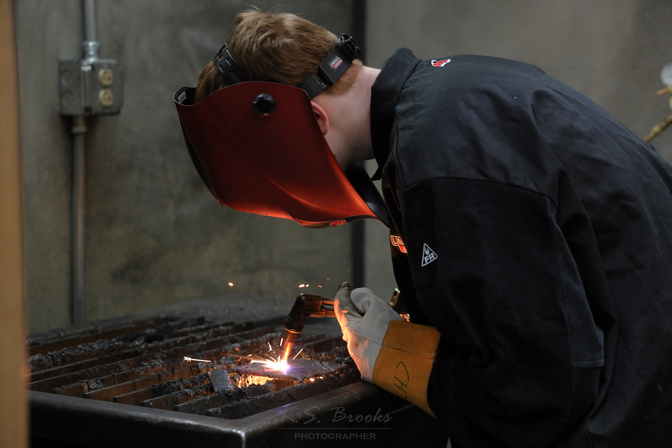
Tired. That’s what I heard in the voices of the local tradesmen I recently spoke to: They sounded tired.
Todd Spradlin, the face on our cover from four years ago when we at the Silverado launched a series of articles to raise awareness of Vanishing Trades – he no longer had that fight in his voice. I became deeply saddened.
We met in a coffee shop to talk about what trends he was seeing with the trades since our last effort and, frankly, it didn’t seem like he was seeing any improvement on his end. Talent was still hard to find, and the businesses in this area – plumbing, electrical, HVAC, and more – continue to be in dire need of workers.
While getting young people – or anyone – to work in the trades may not have improved, there is quite a lot of movement to make things better.
LEGISLATION
Representative Jacquelin Maycumber, 7th Legislative District, introduced Bill 1013 which would establish regional apprenticeship programs. She originally introduced the bill last year, but this year, things took an unexpected turn. The bill would have established one apprentice center on each side of the Cascades. “The bill was a pilot program for just two locations. Well, it was amended in committee – very rarely have I ever seen this happen – it was amended bigger to six locations. So I’m looking at the rural areas that are away from skill centers – you don’t have that ability to go to a skill center after school or a couple of periods a day,” Rep. Maycumber said.
The plan is to have a pathway into a skill center or an apprenticeship program, and to have it guided like students were in college. “You get your acceptance letter and you know where you’re going,” she explained. “These kids will have the opportunity to go through that process.
“This is a hope bill. I think kids have lost hope. I think unless they’re going to college or accepted to college, they don’t know what they have for future options. And we don’t know that there aren’t successful kids that see plumbers and electricians and can do these great things or even go into healthcare unless you get to them early. Unless you can show them that they can be successful in these areas, and they’re not being introduced at that time. And these are some of the most important times of their lives, to really find out what they enjoy and they’re successful at.”
Rep. Maycumber said, “Fifty percent of kids don’t go to college, and we have these programs for kids that are the pathways for secondary education – for the college pathway, but we don’t have anything for the trades – so this program is kind of like the running start for the trades – and it gets kids on a pathway and it guides them not just through the pre-apprenticeship program in the school, but also for after high school.”
Bill 1013 has made it through the House – with 97 yeas and zero nays – and is next heading into the Senate. You can encourage your legislator(s) to support this bill by going to Leg.wa.gov – click on participate in the process – house and to appropriation committee and house bill 1013 or for a shortcut, go to https://tinyurl.com/HouseBill1013 and click “Comment on this bill.”
It has not yet been determined where these six skill centers will be located. When asked who will be tasked with determining that, Rep. Maycumber replied that it is her understanding that the ESDs (Educational Service Districts) will be the ones tasked with that. She suggests that constituents contact the ESDs to lobby for a center in their community.
“This brings the trades to [our youth] and that’s one of the most important things we can do. It keeps them in the area. There are trades that are available in Colville, and then we’re not exporting our most important commodity – our children. We’re not exporting them to Spokane and the Puget sound area. We’re keeping them local, and that’s what this program will do.”
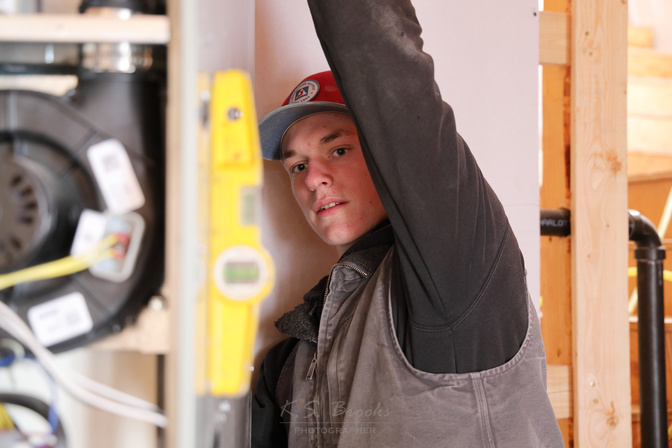
WORKERS WITH HEART
Jim Culverwell, owner of Systech Mechanical, says that the only thing he can do is focus on finding the right employees – educated or not. “The only thing that I figured out – is you look for heart. It may be an ignorant person, but … hearts are humble. Hearts don’t like to disappoint. Good hearts… want to please, to impress and do well. They know there’s a benefit, they trust you to talk the truth, and they want to be a part of it and be willing to win,” he said.
And how do you find workers with heart? “Totally by happenstance – there’s no two ways to put it. You just have to keep looking, you just never give up,” Jim said.
Todd, who now works as the plumbing manager for Northside Heating and Cooling out of Colville, has found the same thing. Workers with heart want to do well, and so they do – and they continue to do so. “The new guy is so meticulous – the contractors on the job site told the homeowners ‘That kid is amazing,’ and the inspector was impressed – that’s what’s keeping me going,” he admitted.
“The new guy” he’s referring to is Jeremy King who went to work for Northside right after high school as an HVAC technician, but is now a plumber. “I started off doing HVAC, and it turned out that it wasn’t for me,” he said. After moving on to personal training, “Jeff [Amich] called and offered me a job here, and I hadn’t tried plumbing and it was something that I was interested in. For me it’s easier [than HVAC] but I really like the mechanics of plumbing. It’s easier than what people paint it to be but it’s also nice because when we finish a job, it’s satisfying to see all the work coming together.”
Jim said that Josh Whittekiend “is 18-years old, and he’s a job foreman right now – very impressive. Incredible. He’d come in every morning into the shop early and he kept working on fittings and working and … he can build every fitting I can make now. He’s got it. It’s very, very cool.”
Josh has now been working for Systech Mechanical for a year and a half. “I never thought I’d do HVAC in my life. … It’s awesome, I love it. I’m doing so many different things, like for instance Tuesday we were putting in an outdoor unit and framing a box, digging, and here we’re on new construction and the next day you could be working on a boiler, you’re all over the place.” Josh enjoys the variety.
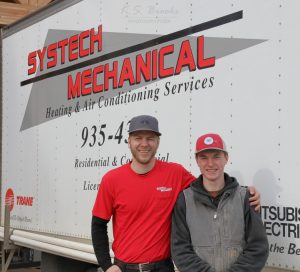
But employees with heart are not necessarily easy to find, and in Systech Mechanical’s case, Jim is seeing the need to slow their growth. “We’re going to reduce the amount of new construction we’re willing to take on because I can only watch so much. I feel it’s important that I see these jobs. I’m going to keep it within my ability.” He has 10-11 guys, and nine out in the field. Jim says he could use more workers, but he needs the right ones.
“I’m at the point where I need somebody that can be a mentor, not a mentee,” he said. “It is tough. You could spend every waking minute trying to find a way to beat the system, and the truth is you could go crazy trying … but there are other things in life to do. I’m content with reducing what I do and reducing the volume and keeping it more manageable and enjoyable. And maintaining a reputation is so important. You try to do more than you can personally manage and oversee, then things get wonky and then you’re doing damage control. I don’t want to be doing damage control, I want to be growing.”
If companies in our region stop growing, and with the number of tradesmen reaching retirement age increasing, this will heighten the crisis we are now in.
SCHOOL CTE PROGRAMS
In our regions, schools have stepped up to the challenge to focus more on career and technical education (CTE) courses for their students. This is super important, as the U.S. Department of Education states “Eight years after their expected graduation date, students who focused on career and technical education (CTE) courses while in high school had higher median annual earnings than students who did not focus on CTE.” And, for those choosing CTE instead of college, they are not only showing a higher median annual income, they are not carrying the debt load of a college loan.
The California Department of Education considers all these industry sectors to fall under CTE: Agriculture and Natural Resources; Arts, Media, and Entertainment; Building and Construction Trades; Business and Finance; Education, Child Development, and Family Services; Energy, Environment, and Utilities; Engineering and Architecture; Fashion and Interior Design; Health Science and Medical Technology; Hospitality, Tourism, and Recreation; Information and Communication Technologies; Manufacturing and Product Development; Marketing, Sales, and Services; Public Services; and Transportation.
Locally, the most popular of all the CTE programs is welding. Enrollment in welding programs, in fact, is extremely good. In late January, 31 high school students participated in a regional contest at Spokane Community College in Spokane. Students from Colville, Newport, Riverside, Deer Park, Freeman, Pullman, and a skills center out of Walla Walla competed for a huge amount of donated prizes including welding helmets.
Travis Stott, Welding Fabrication and Construction Instructor at Newport High School, pulls the competition together and works with Skills USA.
“I’ve been here 23 years,” Travis said. “It’s been a good ride for me. I have probably have 90 kids a day go through my program, but my first period class is a junior high class – 15 or 16 kids.” That means 75 high school students are taking CTE classes each day.
In Republic, David Heinen teaches welding technology, and he sees about 50 students go through his program – out of about 100 enrolled in the high school. David’s been certified through National Coalition of Certification Centers (NC3) and Lincoln Electric to offer his students both beginner and advanced certifications that they can take with them into job searches. Over the last five years, David has been absolutely on fire getting grants to upgrade Republic’s equipment and admits that he’s run out of room.
“Mike Rowe also has a curriculum that goes along with his sweat pledge and through NC3, I was able to get certified to go through his curriculum – so I also … teach the kids what it means to have a work ethic. That’s one of the other big things that’s really a challenge is there’s just so many kids that … don’t know what it means to have a work ethic. That’s one of the things I’ve struggled with because I’ve got all this fancy new, expensive equipment, and kids don’t value that. They don’t’ understand that this is a 10-thousand-dollar welding machine. It’s been really cool going through his curriculum as well. I have had several students get his scholarship – I think I’ve had two or three and they’ve gotten like $5K each.”
“Most schools have welding programs,” Jim Culverwell said. “Look at how many kids come out of school who want to be welders because they know how to weld – that’s great – that’s one tiny little genre – we do welding in what we do from time to time. It’s just one little aspect of what we do. Where can you go where you’re just a welder? Machinists don’t just do welding – they run mills and lathes and use micrometers and build cylinders and every once in a while, they need to weld something. But very seldom is there a job short of building pipelines where you’re dedicated to just welding.”
Jim suggested, “Maybe you spend [time] on welding and then do something else – I imagine they’re struggling to find instructors that can teach those things, but it’s not going to get better. The longer we wait, the situation’s not going to improve.”
In Colville, assistant principal Matt Bateman shared that they have about 21 different offerings under the CTE umbrella. But how do students find out these are available?
“Multiple ways,” Matt answered. “We have a course handbook that has every course outlined, that every kid gets. When we bring in our freshmen from the junior high, our counselors meet with every kid individually to talk to them about their options.”
They added electronics and work-based learning this year, and there is a pre-apprenticeship program for becoming a medical assistant. “Providence took three students and NEW Health took two, and those students are getting practical hands-on experience in the medical facilities,” Matt explained.
“Getting kids into college is still a goal but at the same time we want to emphasize the possibilities… We went to a trades night down at East Valley High School – it was a completely hands-on experience. Indoors they had all different sorts of companies … drywall, pipe bending, and more, and outside, cranes, excavators, concrete pumper trucks, and the kids could actually get in and operate them.”
Matt said, “I think certainly there’s a need in the trades, I think … there’s a lot of options out there: four-year degree, two-year degree, skilled and technical trades, military… CTE options … are good for kids who prefer hands on.”
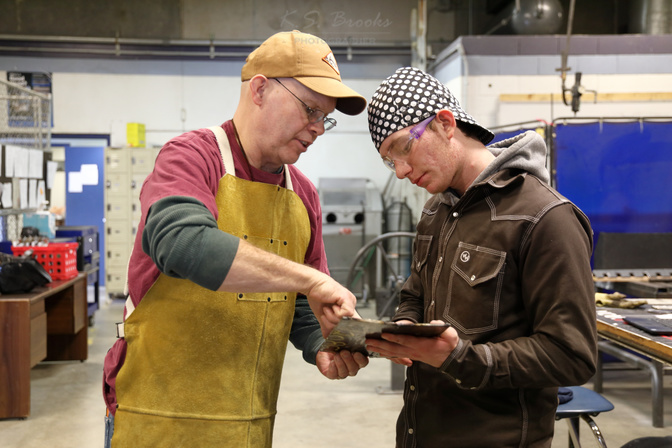
Jenkins High School in Chewelah has been working to revive their CTE programs through Erin Dell, the Chewelah School District’s Director of Student Support Services and the principal at Quartzite Learning. One program they’re particularly proud of is their worksite learning. “Students can work out in the field whether paid or unpaid and earn credit for that through CTE,” Erin said. “So it’s kind of an extension of what they learned in their CTE classes, and they get to go out and work and earn credit to graduate.”
Recently, Erin said they received a grant and were able to purchase some equipment to teach hydraulics and pneumatics. “So they could work at Hartill’s or work at Wuestoff’s.
“We are always looking for more community business partners, who are interested in, whether it’s looking for internships or providing experiences for kids, or coming in and speaking. I think that everybody’s so busy, so that’s something we’re always continuing to build – that community base, and Aubrey’s worked really hard on that this year.”
Aubrey Markel is the coordinator for the worksite learning program, and participating businesses currently include Akers, Wuestoff’s, Quartzite Comfort, the Chewelah Golf and Country Club, Systech Mechanical, Fired Up Pizza, and Subway.
Most of these schools can provide custom projects for community members who are interested in having something built. Contact the CTE coordinator at the school closest to you if there is a project you need or want made, or if you have materials you would like to donate.
THE NEXT STEPS?
At the Spokane Community College (SCC) Colville campus, they are trying hard to bring more technical programs to our region. They currently offer welding and industrial and manufacturing technology programs, but the critical mass in rural areas is an issue, according to SCC Dean of Extended Learning & Workforce Initiatives Jaclyn Jacot. Dean Jacot oversees Rural Education, Act 2, Parent Ed, Library Services, and the Apprenticeship and Journeyman Training Center.
The Spokane campus offers: Apprenticeship and Journeyman Training Center; Architectural Technology; Aviation Maintenance Technology; Automotive; CAD Design and Drafting; Diesel/Heavy Duty Equipment; Electronics; Electrical; Heating, Ventilation, Air-Conditioning and Refrigeration (HVAC); Hydraulic and Pneumatic Automation; Utility Construction (Avista); Machinist/CNC Technology; Mechanical Engineering; Multi-Occupational Trades; Power Systems Maintenance; and Welding and Fabrication. Spokane has the population to support those programs. The less-populated rural struggle to, and classes that don’t meet minimum attendance requirements don’t run.
Before the pandemic, Jaclyn had met with a number of tri-county area tradesmen and leaders to talk about the need for accessible training, but COVID sent a lot of things off-track. “The pandemic caused a mass-retirement that we weren’t prepared for, which impacted the trades even more. We’re in a unique moment in time that I don’t think the solutions that used to work may or may not work to solve the problem. We need a unique solution to a unique problem. And we are not 100 percent certain what that solution is as an institution,” she said.
“It’s not something SCC can solve alone. Apprenticeships start at the industry… it starts with the companies that provide those services, and we are here to support them, whether they want to provide just on-the-job training or they actually want a registered apprenticeship which is official through the state L&I (Labor & Industries) office. I oversee apprenticeship here in Spokane, we have 19 apprenticeship partners in almost all of the building trades. A lot of registered apprenticeship comes through a union, we do have some non-union programs, but the industry partner that’s associated with the plumbers and steamfitters training program – they hire people and then they register those people with us. So we don’t start that ball rolling, we just support them once they have initialized that relationship with the potential apprentice. So that is complicated.”
Dean Jacot recalled that during the meeting up in Colville before COVID, Todd had stated that “in order to get an apprentice plumber, it has to be a one-on-one relationship, so he would have to spend 100 percent of his time with that apprentice, that’s not cost effective.” She recounted that he had said if he could have two or three apprentices, then that could potentially work. “But when we are talking about a one-man operation in Colville versus a 20-man operation in Spokane, they can afford to do a one-on-one in Spokane. So we have a scope problem.”
The one-on-one issue is something that needs to be broached with state lawmakers. “We can’t lobby for that, but some of the trades organizations can,” Dean Jacot said. “So that’s where we as an institution get a little bit caught. We can provide some pre-construction trades training for people who want to go to work or might be interested in apprenticeship, but we can’t just say we’re setting up a plumbing program. I wish we could.
“Somebody somewhere or a group of people has to come up with some possible suggestions on how to fix that critical mass problem with a unique solution to rural communities.
“One thing… is that we are going to explore what a pre-construction trades summer training program for high school graduates or even high school seniors might look like in the tri-county area. We’re looking at doing one here in Spokane and one in the tri-county area. We’ll try it once with high school kids this summer, and if it’s successful, we could potentially look at how to do it with adults. The challenge is, we don’t have the space for a construction program because our industrial training center is set up for manufacturing and welding. So working with the high schools gives us the opportunity to share space, because many of them still have carpentry shops. And that way we could do it somewhere other than Colville, too, because we can partner with local school districts who have a space that might be an option,” she explained.
“That’s what we’re exploring now. Because then at least we’ll have some people who will have some introductory experience, know how to read a tape measure, know how to hammer a nail, may even have a little experience with roofing and some basic running of electrical wire, so that folks can then decide if they want to enter into a college program somewhere, if they want to pursue an apprenticeship, which unfortunately would be located in Spokane, or if they want to go to work for a local employer…”
Dean Jacot said that they have talked to lots of potential people who are interested in starting their own apprenticeship program, and the college has someone who can help companies apply to the state. “That’s probably the big takeaway here – if someone out there has a unique idea, I’m not opposed to hearing unique ideas. I can’t promise I can follow through on everyone’s unique idea, but I would be interested in talking to community members, business owners… I’ve been talking with Joel White who… oversees Spokane Homebuilders Association and also Tri-County Homebuilders. He was at that meeting with us back before COVID, and he’s really interested in doing something. So I think we can probably partner on some things as well.
“We want to listen to the community. We are not going to solve this problem without community input, I mean, that’s why we’re a community college. We do what the community needs, but we need to hear from the community in order to start building some ideas and some energy around this problem again. All of a sudden, it’s reaching a fevered pitch again, so now is the time to capitalize on the situation and see if we can’t come up with some creative ideas.”
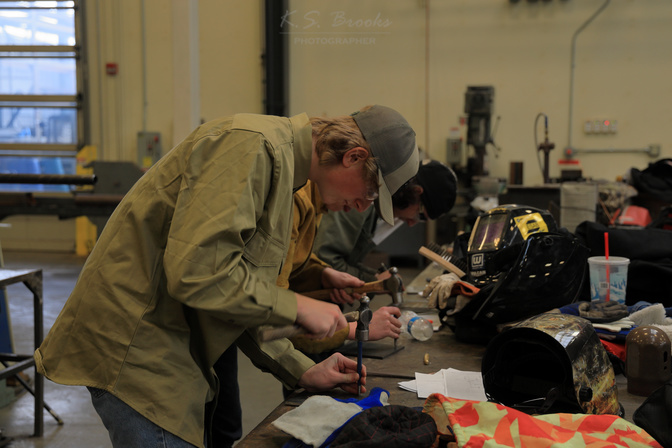
GOT IDEAS?
There are a lot of moving parts here, and a lot of different expertise, participation, team effort, and coordination is going to be necessary to make things work. If you are interested in being a community business partner, mentor, or instructor, or if you just want to help, let us know. Send an email to me at Silverado @ KSBrooks.com or to Gary Douvia at gary.douvia @ gmail.com. We hope to hear from you.
IN CLOSING
Of course this article comes nowhere near to touching on all of the issues that pose hurdles in the trades shortage. But we’re seeing a lot more efforts than back in 2019 to solve it. It just takes a spark sometimes to make things happen, and by the end of my meeting with Todd, after filling him in on Rep. Maycumber’s legislation and Dean Jacot’s thoughts, I saw that spark come back to his eyes. Let’s take action while that spark is still there.